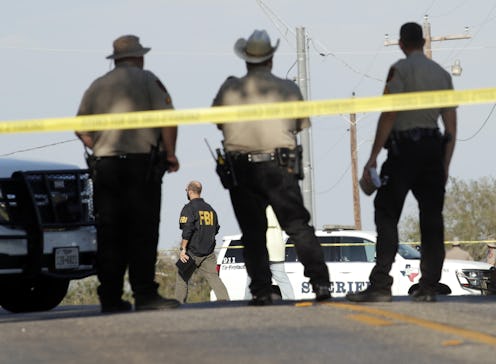News
The Problem With Calling A Mass Shooting “The Worst In US History”

The news that 26 people had been killed in a Sutherland Springs, Texas, church on Sunday brought a new slew of headlines proclaiming, yet again, that the nation had witnessed "one of the worst shootings" in its history. To be sure, the recent shootings in Las Vegas and Texas have certainly been among the worst mass shootings in recent history. But the use of such superlatives is problematic for a number of reasons.
Firstly, such headlines fail to take into account the fact that there are even more devastating mass murders of people of color in our nation's history. Superlatives like "worst ever" unintentionally erase people of color and the atrocities committed against them early in the nation's history.
"It's not an intentional bias, but just because many people are ignorant of the contributions of people of color," Malik Russell, the communications director the at NAACP, tells Bustle. "There is a need to include the contributions and the history of people of color and groups outside the mainstream in our education system."
In a statement released in June 2016 after the Orlando Pulse shooting that killed 49 people, the National Association of Black Journalists (NABJ) and the National Association of Hispanic Journalists (NAHJ) noted that referencing a recent shooting as "the worst mass shooting in American history," negates several other incidents in U.S. history, many of which involved minority victims, like the more than 100 black people who were killed in the East St. Louis Massacre of 1917 and more than 100 black people who were gunned down during an 1873 mass shooting in Colfax, Louisiana.
Both the NABJ and NAHJ suggested that people avoid using superlatives altogether but, if you must, to refer to a recent incident as "the deadliest shooting in recent or modern history."
Russell is quick to point out that the use of superlatives to describe mass shootings isn't about "glossing over" history. It's simply a factor of a greater problem: that African American history isn't as integral a part of the educational system as it should be. "Issues are addressed when people have access to knowledge," Russell says, "when kids of all races can learn about African history in the same way they learn about George Washington."
On the collegiate level, as well, Russell says history should be more inclusive. "There should be a way for people to be exposed to literature that challenges predominately white narratives and includes the contributions of people of color, Asians, Native Americans."
The issue of superlatives when it comes to violence is problematic for another reason: calling something "the worst ever" could spur more violence.
"When you have someone on air declaring, 'This is now largest mass shooting in the U.S., you might also have someone at home saying, 'Ah, and how many was that?'" says Diana Hendricks, director of communications at Texas State University's ALERRT (Advanced Law Enforcement Rapid Response Training) Center.
The issue, Hendricks says, is that shooters are often inspired to one-up those who came before them. "Many of the shooters, you go back and look at their manifestos, and find that they have researched other shooters."
There's already been a concerted effort to change the reaction to mass shootings — specifically as it concerns the identity of the perpetrators. In an October letter sent in the wake of the Las Vegas shooting, nearly 150 university professors and law enforcement officials urged members of the media to refrain from using the names or photos of perpetrators of mass shootings. Naming the perpetrators, the group argued, creates "de facto celebrities out of killers ... rewarding the deadliest offenders with the most personal attention."
The No Notoriety campaign, one of the groups urging the media not to use of the names and photos of perpetrators of mass shootings, has had a number of successes over the past couple of years. CNN's Anderson Cooper, for instance, chose not to say the name of the Orlando shooter on air, and dozens of law enforcement organizations have adopted No Notoriety policies when speaking to the news media.
Survivors say the way shootings are discussed can have an impact on them as well. John-Michael Keyes has been advocating for change in terms of how gun violence is talked about for more than 10 years. His daughter was killed in 2006 by a gunman at Platte Canyon High School. He founded I Love U Guys (a foundation that educates schools and organizations about student safety) in her honor.
"We often see so much attention placed on the shooter — and on how many victims there were — that those were not physically harmed are often marginalized," Keyes said. "The people who need our attention the most are the ones who are left."
With the damage that can be done by calling a mass shooting the "worst ever" — whether by erasing the history of people of color or by potentially encouraging more violence or by marginalizing the survivors — consider not describing something as the "worst." Keyes says that since he first began advocating for gun violence victims, the attitude toward how mass shootings are covered and talked about has changed, but it still has a ways to go.
"It's a process, not a switch," he says. "We're trying to establish a mindset."